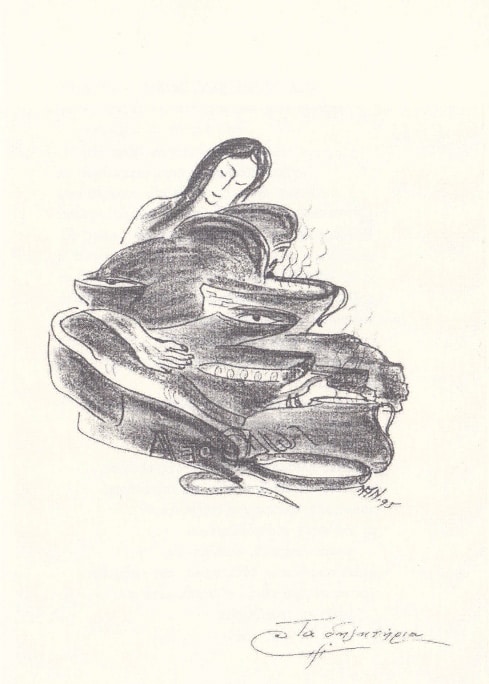Poetry

Nikos Nomikos
Το Αθέατο Ημερολόγιο
στους ταλαίπορους του κόσμου
α’
Παράτησα στην αγκαλιά του ανέμου
της χαράς μου τα ψύχουλα,
πήρα τα παλιά σχέδια, φορτωμένα ταξίδια
και καράβια αμνημόνευτα,
τα παράδωσα γεμάτα εγκαύματα
στά χέρια της μεγάλης ώρας.
Μόνο η φωνή παραμένει ασκοτείνιαστη.
β’
Ήρεμος κι εγκάρδιος κήπος
το πρόσωπο σου ολοφάνερό
γεμάτο ομολογίες εξωδικές,
ο αμπελώνας, μου ‘λεγες,
θα στοιβάζει τη γλυκάδα
στα χείλη της λαμπρής ημέρας
που πλησιάζει, καί τα πουλιά,
όπως τό λέγει η άγρύπνια,
θα μπαινοβγαίνουν στη χούφτα σου
άφοβα,
νερό θα πίνουν στην υγεία σου.
γ’
Όσιε κι αδελφέ μου πολύτιμε
από φυλακής πρωιάς μέχρι νυχτός
η μισή σου είμαι φωνή
μέρα και νύχτα κουβαλώ
τραυματίες απ’ τή σφαγή των Αγγέλων.
δ’
Πεντακάθαρος απέναντι του ήλιου
ο κρυφός σου ουρανός
που δεν χρειάζεται κανένα διαβατήριο
σε ξένους τόπους
γυρίζουν τα χειρόγραφα σου, αμετάκλητα
με το αίμα
της ειμαρμένης μου σπατάλης.
ε’
Μέγας είν’ ο λόγος σου
κι ο έφιππος από τα ξένα μέρη του
κοντοζυγώνει, πάνω στην άσπρη του
σημαία φέρει καί το ρητό που κρέμεται
πιο πέρα απ’ τις σκιές τής μοναξιάς.
Από τα χέρια των νεκρών
δεν έχεις να λαβαίνεις τίποτα,
από τον θάνατο τους όμως
ο ψυχικός σου κόσμος ωφελείτε
τη ματαιότητα.
στ’
Τη νύχτα που πέρασα
από σκληρά μονοπάτια
είδα μια πεταλούδα ολόχρυση
που έκλαιγε τα φτερά της
πάνω απ’ το προσκέφαλό μου
και καταριόταν ένα καράβι
που την άφησε πίσω
ύστερα
στέγνωσε με τ’ άσπρο γάντι
τά δάκρυά της
ένας απρόσοπος άρχοντας
και την πήρε ευγενικά
στην άμαξά του.
ζ’
Δόξα σοι…
η ευτυχισμένη τροχιά
απολύεται σιγά σιγά
την οπτική των ήχων.
Το χρονικό μου επικύεται
σε μεσουράνια θραύση
κι αρχίζει να φαίνεται
ο Ορφέας ολόσωμος
απ’ τά δικά του σύννεφα
κρατώντας εμβατήρια πραότητας
με κεριά τριγύρο αναμένα
απ’ την τρισύλλαβη φωνή.
Χαιρετισμούς διαλάλητους
απ’ τή ζωή τήν πρώτη.
η’ *
Ανάμεσα στο σκότος τής όδύνης
τα βήματά σου έζησα
«αυτά» μου είπες
«είν’ το προζύμι της ανάστασης».
*A slightly modified version of this poem was later used by the poet as the epigraph of his collection Σημειωμένες Διαφάνειες / Noted Transparencies (2003; 2016)
θ’
Οι μέρες πια στους κήπους συρρικνώθηκαν
και είμ’ άνεργος, στης μοναξιάς τον πύργο
κεκλεισμένος.
έχω αξεχρέωτα ακόμα τα πολύφωτα
– πιστεύω δικαιούμαι κάποια έκτωση
στο ταξιδιωτικό μου ναύλο.
ι’
Μέσα στα ρόδινα χείλη της αυγής
μονάχο το αίμα του γεύεται
τους παλμούς της μεγάλης φανέρωσης.
ια’ **
Από μακριά
βαμένη η λίμνη μέσ’ στις άχνες της
και πιο μακριά
να σου κρατούν παρέα
αμαρυλλίδες απομόναχες
κι ακόμα πιο μακρύτερα
ό τόπος που φυτρώνουν
οι ακακίες στα οράματα.
Όμως, αυτός που ξέρει την αλήθεια
δεν μιλά.
Γι’ αυτό
πανω απ’ το έδαφος, τα φίδια
είναι ακίνδυνα.
** A slightly different version of this poem was previously published in the anthology Αλλόχθονα Τοπία: Ελληνόγλωσση Ποίηση Αυστραλίας-Καναδα / Allochthona Topia: Greek-language Poetry from Australia and Canada. Edited by Helen Nickas and Stephanos Konstantinides. Owl Publishing, 1998.
ιβ’
Αμαρυλλίδα μου … Αμαρυλλίς,
δασκάλα των μικρών
ματιών μου,
το ημερολόγιο
του παλιού καιρού
αθέατο είναι
«μή το ξεχνάς».
The Unseen Journal
to the wretched of the world
i
I abandoned to the wind’s embrace
the crumbs of my happiness,
I took the old drawings, loaded with journeys
and ships immemorial,
I delivered them full of burns
into the hands of the holy hour.
Only the voice remains undarkened.
ii
A serene and warm-hearted garden
your countenance unmistakeable
full of extrajudicial confessions,
the vineyard, you used to tell me,
will be pressing its sweetness
on the lips of the bright day
that is approaching, and the birds,
as it is told by sleeplessness
will be coming and going from your cupped hand
fearlessly,
they will be drinking water to your health.
iii
My precious sacred one and brother
in prison morning until night
I am half of your voice
night and day I carry
the wounded from the slaughter of the Angels.
iv
immaculately clean before the sun
your secret sky
that requires no passport
to foreign lands
your manuscripts return, irrevocable
with the blood
of my doomed squandering.
v
Great is your word
and the horseman from his foreign lands
is approaching, upon his white
flag also brings the motto that hangs
farther than the shadows of loneliness.
From the hands of the dead
you have nothing to keep,
from their death however
the world of your soul is to the benefit
of vanity.
vi
The night I passed
by harsh pathways,
I saw an all-golden butterfly
that was weeping for its wings
above my pillow
and was cursing a ship
that had left her behind
later
drying with a white glove
her tears
a faceless lord
and he took her politely
away in his carriage.
vii
Glory be to you…
the happy orbit
is dismissing slowly slowly
the optics of sounds
My timeline moves towards
fracturing mid sky
and becoming visible
is Orpheus in full body
from his own clouds
holding marches of meekness
with candles all around lighted
by the trisyllabic voice.
Greetings crying out
from the first life.
viii
Within the dark of anguish
your footsteps I inhabited
“this” you told me
“is the prozyme of resurrection”.
ix
Now the days spent in gardens have dwindled away
and I’m unemployed, in loneliness’s fortress
locked up.
and I have the light fittings yet to be paid off
– I believe I am entitled to some sort of discount
to my travel fare.
x
Inside the rose-coloured lips of dawn
only his blood tastes
the pulse of holy revelation.
xi
From afar
the lake painτed within its vapours
and farther away
to keep you company
amaryllises standing alone
and farther away still
the land where do grow
acacias in visions.
But he who knows the truth
does not speak.
That is why
above the terrain, the serpents
are harmless.
xii
Amaryllida of mine … Amaryllis,
teacher of my meagre
eyes,
the daily journal
of the old age
is unseen
“do not forget it”.
Translated by George Mouratidis

Τα Δηλητήρια / The Poisons (1995) by Nikos Nomikos. Ink and charcoal on pressboard.
看不见的日誌
致世上受苦受难的人
1.
我舍弃了风的怀抱
我幸福的碎屑,
我拿着旧图纸,满载着旅程
还有难忘的船只,
满是烧伤当我把它们送到
神圣时间的手中。
唯有声音没有变暗。
2.
宁静温馨的花园
你的面容毋庸置疑
充满了庭外的供词,
葡萄园,你曾经告诉我,
将把它的甜蜜紧压在
晴朗之日的嘴唇上
它正在临近,而鸟儿们,
就像无眠者所说的
会从你捧起的手上来来去去
无所畏惧,
它们会为你的健康饮水。
3.
我珍贵的圣者和兄弟
在监狱里从早到晚
我是你声音的一半
日日夜夜我背着
被天使的屠杀者所伤的人。
4.
在阳光下一尘不染
你秘密的天空
不需要护照
到异国他乡
你的手稿返回,不可逆转
带着血液里
我注定的挥霍。
5.
伟大的是你的话语
来自异国他乡骑马的人
正在接近,并在他白色的
旗帜上带来悬挂的座右铭
超越了那些孤独的阴影。
从死者手中
你没有什么可留取的,
然而从他们的死亡
你灵魂的世界是有益的
徒劳。
6.
我经过的那个晚上
穿过崎岖的道路
我看到一只全金色的蝴蝶
在为它的翅膀哭泣
在我的枕头上方
并且正在诅咒
那艘抛下她的船
后来
用一只白手套擦干
她的眼泪
一个不露面的领主
他礼貌地接上她
在他的马车上。
7.
荣耀归于你…
快乐的轨道
正在慢慢地消散
声音的光学
我的时间线移向
破裂的中层天空
开始显现的
是俄耳甫斯的全身
从他自己的云端
举行着温和的游行
周围所有的蜡烛
由三音节的声音点燃。
呼喊的问候
来自最初的生命。
8.
在痛苦的黑暗里
我居于你的脚步中
“这个” 你告诉我
“是复活的原酶”。
9.
如今在花园里度过的日子已逐渐减少
并且我失业了,在孤独的堡垒里
锁着。
而我的灯具还没有付清
– 我相信我有权享受
旅费的某种折扣。
10.
在黎明玫瑰色的嘴唇里
只有他的血能品尝
神圣启示的脉搏。
11.
在远方
湖泊被画在它的水汽中
而更远处
陪伴你的
孤挺花孤独地站立
还有更远的地方
那里的土地生长着
异象中的金合欢。
但那个知道真相的人
他不说话。
这就是为什么
在那个地形上,蛇
是无害的。
12.
我的阿玛利达 … 孤挺花,
小孩子的老师
眼睛,
每天的日誌
那旧时代
看不见的是
“不要忘记它”。
Translated by Helen Jia (西贝)
Nikos Nomikos is the author of ten poetry collections in the Greek language. Noted Transparencies, a translation of his 2003 collection Σημειωμένες Διαφάνειες, was published in 2016 by Owl Publishing. A new edition of Nomikos’ 1997 collection Το Αθέατο Ημερολόγιο (‘the unseen journal’) was published in Greece in 2021 by Stochastis, with an English translation forthcoming.
